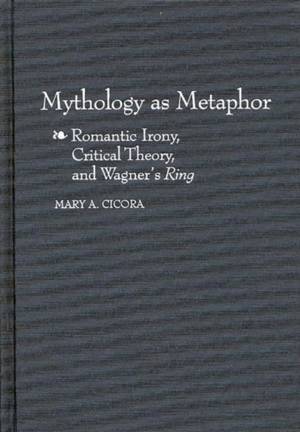
- Retrait gratuit dans votre magasin Club
- 7.000.000 titres dans notre catalogue
- Payer en toute sécurité
- Toujours un magasin près de chez vous
- Retrait gratuit dans votre magasin Club
- 7.000.0000 titres dans notre catalogue
- Payer en toute sécurité
- Toujours un magasin près de chez vous
Mythology as Metaphor
Romantic Irony, Critical Theory, and Wagner's Degreesuring Degreesr
Mary a CicoraDescription
This literary and critical approach to Wagner's Ring provides an original interpretation of the Ring tetralogy and challenges the standard political analyses of the work. The Ring is examined in the tradition of the Romantic drama as a reworking of Greek tragedy as theoretically expressed in the second part of Oper und Drama. In the Ring, using myth as a metaphor for history presents a paradoxical world. The innertextual reflection that Wotan performs in his monologue causes the Ring to self-destruct from within. He actually dismantles or deconstructs the text of the Ring. The doom of the gods happens because the Ring has undermined, unworked, and dismantled its system of signification.
Studies of Wagner's theoretical writings and music-dramas have not emphasized aspects of his works within the tradition of German drama and aesthetic theory. This discussion of Wagner's revision of Greek tragedy in Oper und Drama, supplemented by an original interpretation of the Ring operas, places Wagner's writings within these realms. As a fresh interpretation of the Ring tetralogy, this valuable analysis will appeal to Wagner scholars and musicologists interested in Wagner's operas as well as to German cultural history and literary scholars.Spécifications
Parties prenantes
- Auteur(s) :
- Editeur:
Contenu
- Nombre de pages :
- 184
- Langue:
- Anglais
- Collection :
- Tome:
- n° 46
Caractéristiques
- EAN:
- 9780313305283
- Date de parution :
- 10-06-98
- Format:
- Livre relié
- Format numérique:
- Genaaid
- Dimensions :
- 163 mm x 242 mm
- Poids :
- 444 g

Les avis
Nous publions uniquement les avis qui respectent les conditions requises. Consultez nos conditions pour les avis.






